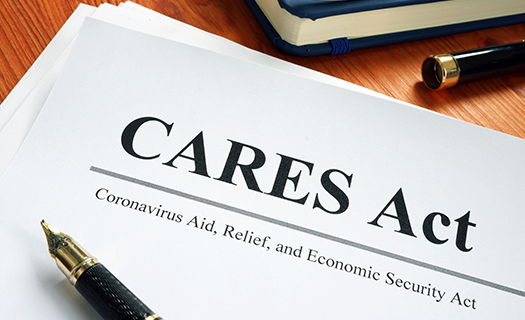CARES Act for Individuals
June 3, 2020 Author: Matthew A. Caras, CPA, Compass Pointe CPAs

The Federal Coronavirus Aid, Relief, and Economic Security (CARES) Act was signed into law by President Trump on March 27, 2020. The Act provides a large number of provisions that impact businesses, workers, families, and the economy. Below you will find some of provisions that will directly impact individual taxpayers. We encourage you to contact our office with any questions or concerns.
Retirement Funds
Required minimum distribution requirements will be temporarily waived for the calendar year 2020.
The CARES Act waives the 10% penalty on early distributions from qualified retirement plans for up to $100,000 of COVID-19 related distributions in 2020. Taxpayers may repay these amounts within three years of withdrawal without regard to that year’s cap. Although these distributions are otherwise taxable for federal income tax purposes, the taxpayer may elect to include the distribution in taxable income ratably over a three-year period
A “COVID-19 related distribution” is a distribution made during 2020:
1. To an individual who is diagnosed with SRS-COV-2 or COVID-19 by a test approved by the CDC,
2. whose spouse or dependent is diagnosed with one of the two diseases, or
3. who experiences adverse financial consequences as a result of being quarantined, furloughed or laid off or having work hours reduced, or being unable to work due to lack of child care
Cash Payments (Recovery Rebates)
Most individuals earning less than $75,000 ($150,000 if married filing jointly (MFJ)) can expect a one-time cash payment of $1,200 ($2,400 if MFJ), along with an additional $500 for each child 16 years old and younger. The payment amount available to you begins to phase out as your adjusted gross income for your 2019 tax return (or your 2018 tax return if your 2019 tax return has not yet been filed) exceeds $75,000 ($150,000 if MFJ). The payments will be made electronically if you have provided direct deposit information to the IRS on these returns. Within 15 days of payment, the IRS will send each eligible taxpayer a letter to a last known address with details of the amount, date and method of payment, along with a number to contact if the taxpayer did not receive the payment.
The payment a taxpayer receives is actually an advance payment of a credit you were to receive on your 2020 tax return. This means you will need to compute the credit on your 2020 tax return:
1. If you were due more (i.e. made less money in 2020 and/or had a child in 2020) that excess will be treated as a credit on your 2020 taxes
2. If you were due less (i.e. made more money in 2020 and/or your dependent turned 17) then it is expected you will not have to pay back that difference. Currently, there is no provision to treat the excess amount as taxable income.
3. The money received will not be treated as taxable income
Unemployment Insurance
The CARES Act expands those covered by unemployment insurance to include those unemployed, underemployed or unable to work in the following situations:
1. The individual or a member of the individual’s household has been diagnosed with COVID-19 or is experiencing symptoms of COVID-19 and seeking a medical diagnosis; the individual is providing care for a family member or a member of the individual’s household who has been diagnosed with COVID-19; a child or other person in the household for which the individual has primary caregiving responsibility is unable to attend a school or another facility that is closed as a direct result of the COVID-19 and such school or facility care is required for the individual to work;
2. The individual is unable to reach the place of employment because of a COVID-19 quarantine or self-quarantine advised by a healthcare provider;
3. The individual was scheduled to commence employment and does not have a job or is unable to reach the job as a direct result of COVID-19;
4. The individual has become the breadwinner or major support for a household because the head of the household has died as a direct result of COVID-19;
5. The individual has to quit his or her job as a direct result of COVID-19;
6. The individual’s place of employment is closed as a direct result of COVID-19
The CARES Act adds $600 for four months to the unemployment benefit determined under existing state laws. The enhanced unemployment assistance will be made available without any waiting period. If state benefits run out and an individual is still unemployed, the federal government will provide 13 additional weeks of unemployment insurance through December 31, 2020.
Charitable Deductions During 2020
Taxpayers who take the standard deduction are allowed an “above-the-line deduction” of up to $300 for charitable contributions made in cash to any qualifying Section 501(c)(3) public charity, excluding donor-advised funds. For taxpayers who itemize, the 60% of adjusted gross income (AGI) limitation is suspended for charitable contributions made in 2020.
If you have any questions about the CARES Act, please contact us at Compass Pointe CPAs.
Let's Have A Virtual Chat
Compass Pointe CPAs is taking precautions to help protect our clients and staff during this pandemic. Please be mindful of others and avoid coming into our office if you are ill or have been exposed to someone who is ill or tested positive for the COVID-19 virus.
For your health and safety, we schedule convenient virtual appointments during our office hours. Appointments with our partners are subject to their availability.
Monday through Thursday, from 8 a.m. to 6 p.m.
Fridays from 8 a.m. to Noon (during June and July)
Saturdays from 8 a.m. to noon








